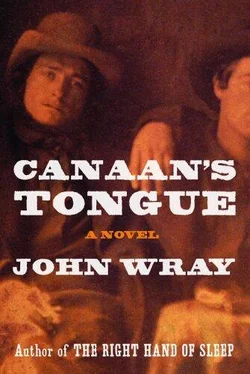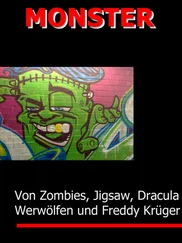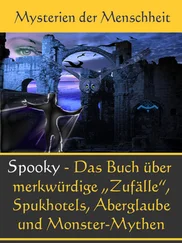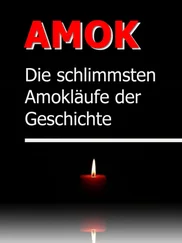Our parting that morning was not especially grave. Clem had awoken in an almost trance-like state of indolence, sloe-eyed and contented, and barely saw me to the door. I’d never seen her so untroubled. One reason for this, I flattered myself, was her growing faith in me—; another was revealed to me soon after. As I was buttoning up my great-coat, she beckoned me to her trunk and brought forth two glass vials, the kind sleeping-draughts are sold in, for me to admire.
“If things don’t run well, little olive, don’t you fret. There’s more than one way to serve the R— his quittance.”
I took one of the vials and brought it to the window. It held an ounce of oily liquid and a tuft of light-brown hair. I nearly choked. “Where did you get this, Clem, for the love of Christ?”
She only smiled. “Don’t you worry about that. Only remember—: any one of those hairs is as good as a brace of pistols.”
“This is Morelle’s hair? The Redeemer’s?”
She nodded, taking the vial back from me and slipping it into her pocket. I looked at her mutely, feeling, as I so often did, that I’d never truly made her out before. Her trust in those bottles was childish, of course, and put me in mind of Asa Trist—; yet hadn’t I myself, only the day before, seen the future reflected in a spinning marble?
I kissed her on the brow and left her. I was to return within the week. If Morelle remained alive, we’d sail at once for La Habana—; if he was dead, we’d sail for any port we pleased.
I KEPT MY EYES HALF-CLOSED WHEN VIRGIL LEFT, says Clementine. I hardly missed him.
I hardly missed him because I was full of him. I was filled up precisely, like a measuring-cup. Such a simple thing, and plain! The thought and the smell and the weight and the manner and the notion of Virgil Ball. That he, out of all of them, should have filled me so exactly! Not to overflowing, mind, not gluttingly—; but never a half-grain short. I moved about the room with my head held straight, like a debutante working at her posture, for fear that I should spill a single drop.
I spent the morning ordering my trousseau, which I’d thrown together willy-nilly, and sorting Virgil’s heap of clothes. Not since my eleventh year had I folded someone else’s linens. What a queer thrill I got, what a half-forbidden feeling, from arranging his sundries on the window-bench! He’d taken nothing with him but a jack-knife and a candle. His shape was still pressed hard into the bed. I took off my shift and my bloomers and laid myself down in it. I felt snug in his outline, like a mouse in its burrow. It was mid-day by then, and hot as blazes already. The old man creaked about upstairs. A chill came up suddenly through the heat, making me feel small and solitary—: then I remembered. I’d forgotten it for a while, as there’d been so much else to think of. But it came back to me just then, and blew the solitariness off like smoke.
I had a family in me.
I woke with a start, dry-tongued and foreign-feeling. A rapping sounded at the door. I opened it on Goodman Harvey.
He looked at me and gave a cry. Had he expected someone else? I wondered. I had yet to come all the way up out of sleep.
“Something terrible hath happened, mith,” he said, keeping his eyes screwed downwards.
“What?” I said.
“I’ll wait here, on your convenienth, mith,” he mumbled, clapping a hand over his eyes.
Then I understood, and gave a laugh. “Just a minute, Mr. Harvey,” I said, and went to fetch my shift. He was all but making the sign of the cross when I looked back at him. I laughed again. “Don’t be shy, Mr. Harvey! Won’t you step inside?”
“No, mith!” he said.
He was sorely in distress. His face was tight and blanched and the spot where a chin would be on anybody else was all aquiver. He stood shuffling his feet, moving without going anywhere, exactly the way Virgil used to do. “Mith Clementine,” he mumbled. “It painth me very much to tell you—”
Virgil!
I threw a shawl over my shift and rushed back to the door. “What is it, Mr. Harvey?” I cried. The chill was upon me again and I felt barer than before. I could all but see my breath. “What is it, sir?”
Harvey’s mouth worked for a moment to no effect at all. “It’th Virgil, mith!” he got out at last. “I’ll take you to him.”
THE END OF ME BEGAN THAT MORNING, Virgil says. After parting from Clementine, I booked passage on the E. P. Fairchild —owned and operated by one of our guilds — and landed at 37 the next day. Following me off the boat were sixteen cattle-fixers, two assembly-men from Natchez Township, fourteen mulattoes carrying sackfuls of silver rings, and a dealer in Arabian thorough-breds. None save the assembly-men were there to meet with the great Redeemer, but all came on Trade business—; there was no other business any longer. Local competition had either been eaten alive or given generous permission to emigrate to the United States.
I discovered Morelle, after a long and byzantine search, on the same crumbling pier that the run up to Memphis had started from. Kennedy loitered a few yards down the bank, chucking pebbles at the current. Morelle was staring down the river with a melancholy, abstracted look, the look of a man who’s misplaced something very dear. He seemed greatly changed to me. In the dull light off the water he looked frayed and defeated, nearer the Colonel’s age than my own. He gave no sign of seeing me. In my confusion I began to wonder if he was waiting for the arrival of the E. P. Fairchild.
“The Fairchild is tied up across the way, sir,” I said tentatively.
“Thank you, Kansas,” he said. “I’m not waiting on the E. P. Fairchild. ”
“What are you waiting on, then?” I hesitated. “Parson?”
“Parson? Why do you ask?” Now he turned and looked at me. “Do you have need of religious counsel?”
I hushed at once, studying his face for signs of spite or mischief. He was looking at me squintingly, as though he found me hard to see. He seemed impatient to turn back to the river.
“What were you doing in New Orleans, Virgil?” he said after a time. “You and I were to have a conference.”
I stared at him a moment. “But you walked me to the landing yourself, sir! You seemed to have no further need of me. I waited the better part of a week—”
“But you were impatient, ” he said. His voice was low and thoughtful. “Impatient to get to town.”
All at once I recollected Clementine. “Let’s have that conference now,” I said.
Morelle cocked his head at me. “You’ve never been anxious for a conference before, dear K.”
I cleared my throat. “I’ve had a vision, sir.”
He frowned up at me, cautiously, circumspectly—; then suddenly his look brightened and he clapped his hands. “Without the aid of the candle? We’re finally making progress, Kansas! Now, if you remember the shapes clearly, we can—”
“There were no shapes, sir—; there were only pictures. And I understood them perfectly. I’ve no need of your charts and mummeries any longer.”
Morelle’s face went slack for the briefest of instants—; but he recovered himself straight-away. “It’s wonderful what one can under stand, dear K, with the help of a dram or two of port.” He scratched at his nose. “How’s our little general? Well oiled, I hope? Thoroughly brocaded?”
In spite of his care-free air I saw clearly that he was troubled. I decided to press my advantage. “I’m a different man since I came down from Memphis, sir. I believe in things that I’d have considered sheer madness this time last week.”
Читать дальше












